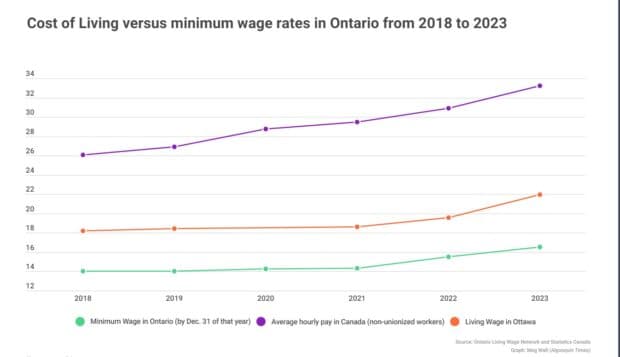Last month, the Ontario minimum wage increased from $15.50 to $16.55 an hour in an effort to offset the increasing costs of living, but Algonquin College students aren’t exactly celebrating.
Ali Albaawadh, who bartends at both the Algonquin College Ottawa campus bars, said the increase is “bittersweet.”
“If you told me I would have gotten a raise for $1.50, I would have been happy,” said Albaawadh. “But just as a minimum wage, it still doesn’t seem as good. It doesn’t do as much to show that we’re being valued. And things are inflating at a faster pace than we’re getting raises. And it’s hard to keep up.”
Monte McNaughton, Ontario’s Minister of Labour, Immigration, Training and Skills Development, said in a statement in March that the minimum wage increase “is a fair and balanced approach” for Ontarians to have “more money in their pockets.”

Business administration student Djibril Fall, who works part-time at the Jack Doyle Athletics and Recreation Centre, said he still finds himself stressed out financially.
“Minimum wage before had rarely done much in terms of staying above water and I think the jump is not that significant,” said Fall.

In July 2023, Statistics Canada reported 53.5 per cent of students and other persons aged 15 to 24 were employed in Ontario, down from 54.8 per cent the previous year.
Early childhood education student Courtney Kittmer, who works as a supervisor at the Wolves Den restaurant, also hasn’t found much of a difference since the increase.
“I don’t see the biggest point on why they did it,” Kittmer said. “We’re kind of at the same spot as we were.”
Other provinces across Canada also saw their minimum wage increase this past year. Saskatchewan, Manitoba, Nova Scotia, Prince Edward Island and Newfoundland and Labrador raised their minimum wages to $16.55 per hour, while Saskatchewan’s minimum wage was raised to $14 per hour.
“It’s almost like we were making what we were supposed to make in the first place,” Fall said.


